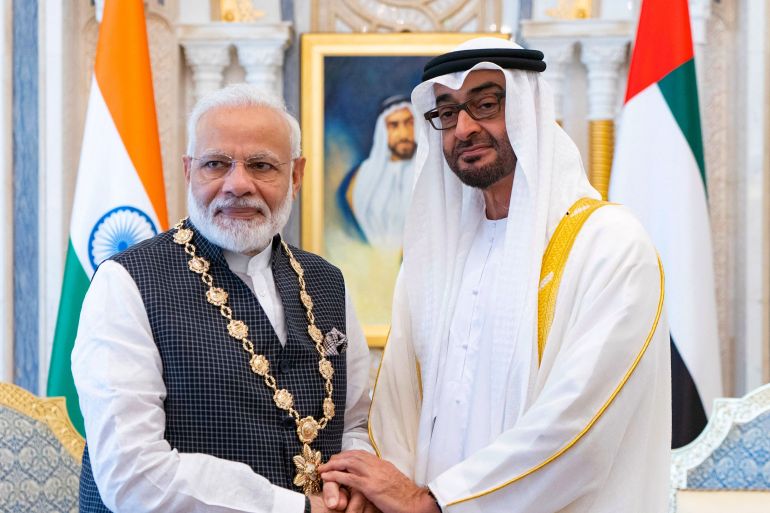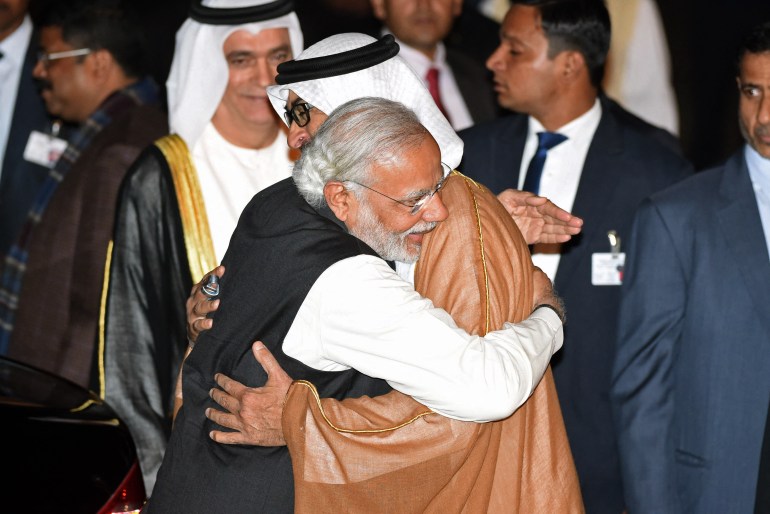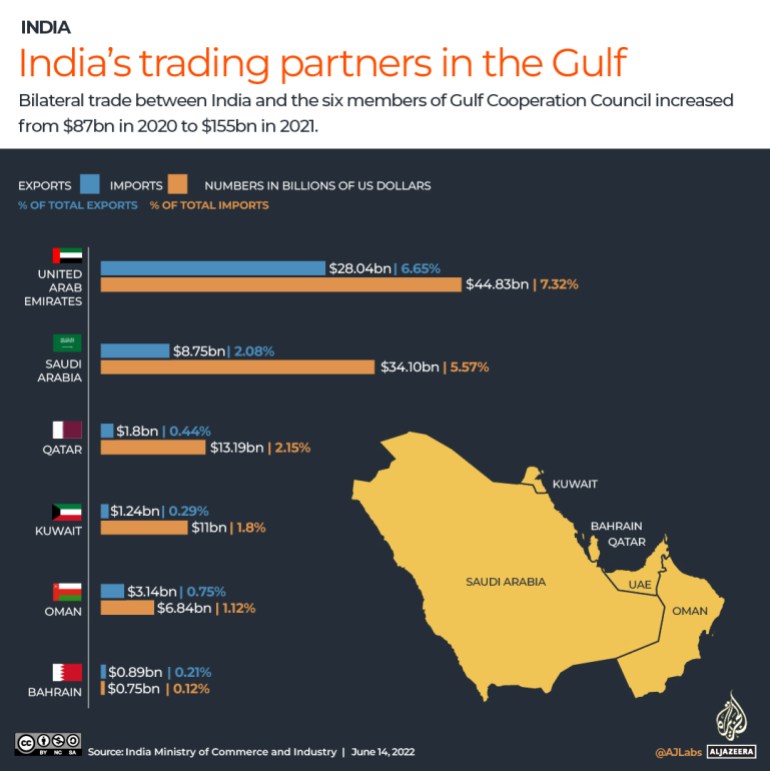How will the Prophet remarks row affect India-GCC ties?
Insulting remarks against the Prophet by India’s ruling party officials trigger a diplomatic backlash in the Muslim world.

Insulting remarks against Prophet Muhammad by leaders of India’s ruling Bharatiya Janata Party (BJP) have triggered wide criticism from Arab countries, with experts saying the diplomatic backlash might be “potentially damaging” to the relations between India and oil-rich countries in the Middle East.
Last week, Qatar led a chorus of regional diplomatic condemnation as it summoned India’s ambassador and sought “a public apology” from New Delhi over the insulting comments. The rare move came as India’s Vice President Venkaiah Naidu, a member of the BJP, was on a state visit to Doha.
Keep reading
list of 4 itemsInsulting Prophet Muhammad is straight out of the BJP playbook
India: Is politics fueling attacks on Muslims?
‘Hindutva pop’: The singers producing anti-Muslim music in India
In a strongly worded tweet, Qatar’s Assistant Foreign Minister Lolwah al-Khater also highlighted “dangerous levels” of “Islamophobic discourse” in India.
I think you cannot be outraged by statements of India's governing party leaders on the one hand and become an enabler of the current Indian government by giving it recognition through honours and investments in India.
The UAE and Saudi Arabia also joined other members of the six-member Gulf Cooperation Council (GCC), along with more than a dozen other Muslim-majority countries, in condemning the derogatory remarks against Islam’s prophet – a perceived red line in the Arab and larger Muslim world – and his wife, Aisha.
“I cannot remember last time such a strong and angry response from the GCC countries to domestic politics in India,” said Michael Kugelman, deputy director and senior associate for South Asia at Wilson Center, adding that it could be “potentially damaging”.
“Even on the issue of Kashmir, the GCC countries had really subdued reaction,” Kugelman told Al Jazeera.
Damage control
The Indian government went into damage control, suspending its spokesperson who made the disparaging comments and expelling another leader for his tweets in defence of the BJP spokesperson.
The foreign ministry also deputed its diplomatic corps in Muslim-majority countries to explain the government position that India respected all religions and the derogatory remarks did not come from the government but were made by “fringe elements”.
Critics, however, said the BJP could not be trusted on its word as anti-Muslim rhetoric is central to the politics of the Hindu nationalist party, which has been running the country of 1.3 billion people since 2014.
BJP believes that just like the Gulf countries ignore the Chinese actions against Muslims in Xinjiang, they will also give India a free pass.
Manoj Joshi, a senior analyst at Observer Research Foundation in New Delhi, told Al Jazeera the BJP would double down on its anti-Muslim rhetoric.
“It [BJP] believes that just like the Gulf countries ignore the Chinese actions against [Uighur] Muslims in Xinjiang, they will also give India a free pass.”
On Sunday, the BJP government in northern Uttar Pradesh state demolished houses of Muslim activists who protested against anti-Islam comments, causing social media anger.
What explains the diplomatic outrage?
But what explains the rare diplomatic outrage from Gulf countries?
Mahjoob Zweiri, director of the Gulf Studies programme at Qatar University, says under India’s ruling party anti-Islam and anti-Muslim rhetoric has been rising in the last few years, and the insulting remarks coming from the ruling party functionaries, he says, particularly angered people in the region.
“There are people who are upset in Qatar and Saudi Arabia, so governments had the responsibility to say it’s not acceptable.
“You have to respect our religion.”
The diplomatic backlash has put the spotlight on the spike in anti-Muslim rhetoric under the BJP in the past eight years, during which Muslims have been largely marginalised politically and have faced increasing attacks by Hindu far-right groups, with dozens lynched over rumours of beef consumption or cow slaughter.
Discriminatory policies and laws such as the Citizenship Amendment Act and the National Register of Citizens threaten to disenfranchise Muslims who number nearly 200 million – making India the country with the third largest Muslim population in the world. In the northeast Indian state of Assam nearly two million people, including Muslims, were removed from the citizen list in 2019, effectively making them stateless.
In recent months, prominent Hindu religious leaders, many of them with links to the BJP, have made calls for genocide of Muslims, but hardly any action has been taken against them.
The demonisation of Muslims at the start of the COVID-19 pandemic more than two years ago triggered a backlash in the Gulf countries. Many Indian Hindus working in GCC countries were fired for posting Islamophobic comments linking Muslims to spreading coronavirus. But back then, only Kuwait expressed deep concern over the treatment of Muslims in India.
Flood of anti-Muslim rhetoric
GCC countries have been relatively quiet about India’s treatment of its minorities in recent years, and prior to the ascension of the Hindu right to power in 2014, they largely refrained from commenting on what they believed was an Indian internal matter.
But the flood of anti-Muslim rhetoric in recent years seems to have caught the attention of people outside India, including rights organisations. Amnesty International and Human Rights Watch warned against rising Islamophobia, accusing the Indian government of targeting minorities.
Last week, a US State Department report said that some Indian officials were ignoring or even supporting rising attacks on religious minorities, drawing sharp retort from New Delhi.
In January, Gregory Stanton, the founder and director of Genocide Watch, said there were early “signs and processes” of genocide in Assam and Indian-administered Kashmir.
India, like China, has traditionally taken strong exception to foreign criticisms of its treatment of minorities, saying it is its internal matter. It has also routinely denounced the US Commission on International Religious Freedom, an autonomous government panel, which has highlighted the rising attacks on Muslims in India.

Zweiri, from Qatar University, said the diplomatic crisis will “affect the relationship, though it won’t happen overnight”.
“Why is India following China in insulting Islam and Muslims rather than understanding and engaging them, considering the economic interests with the Muslim world?
“And I am not sure India has interest in doing so,” he said.
But trade between India and the GCC has continued to grow, reaching $155bn in 2021-22 compared to $87bn a year before. A bulk of the trade involves oil and gas imports as New Delhi sources 60 percent of its petroleum supplies from GCC countries.
India annually receives more than $50bn in remittances sent by more than 8 million Indians who work in the GCC countries, with Indian businesses participating in the success of the region’s economy.

Kugelman, of the Wilson Center, said the GCC countries may not risk rocking the boat, given that India was an important trading and strategic partner.
India has historically close relations with the GCC but under Prime Minister Narendra Modi, geo-strategic cooperation has been strengthened with the UAE and Saudi Arabia. Modi has put renewed focus on the Middle East as part of his “Look West” policy. New Delhi now counts UAE and Israel among its closest strategic partners.
Last month, a free-trade agreement between India and the UAE that will waive tariffs on most of India’s exports to the Gulf state came into force.
“I know India’s ruling party has different calculations,” Zweiri, the Qatar University professor, said, referring to India banking on ties with the UAE and Israel.
“It relies on the triangle of UAE-Israel-India, in the wake of the Abraham Accords,” he said. A number of Arab countries, including the UAE and Bahrain, established diplomatic relations with Israel in 2020 as part of the so-called Abraham Accords.
‘An enabler of the current Indian government’
Critics have criticised some Gulf nations forging closer ties with India under Modi despite the rise in anti-Muslim attacks.
Mohamad Junaid, assistant professor at Massachusetts College of Liberal Arts in New York, said the GCC countries needed to understand what has been happening in India for the last few years.
“The current Islamophobic comments are part of the larger campaign of violence against Indian Muslims and against Kashmiri Muslims.
“I think you cannot be outraged by statements of India’s governing party leaders on the one hand and become an enabler of the current Indian government by giving it recognition through honours and investments in India,” he said, referring to the proposed investments in Kashmir in the field of infrastructure, health and agriculture from UAE-based businesses.
The UAE conferred its highest civilian award on Modi weeks after New Delhi stripped Indian-administered Kashmir of its limited autonomy in 2019.
Saudi Arabia followed suit in honouring Modi, whose government had imposed at the time a sweeping security and communication lockdown in Kashmir.
Kashmir – home to 12 million people – is now directly run from New Delhi in disregard to the democratic aspirations of its majority Muslim population. The state legislature was suspended in 2019 following the removal of the region’s special status.
Kugelman said the current diplomatic dispute is unlikely to derail the ties between the GCC and India.
“The GCC countries are certainly going to release statements of condemnation and continue to demand apology,” he said.
“But I do not think that GCC could retaliate in ways that could imperil their relations with India because they would want ensure to keep trading with sixth largest economy in the world,” he said.
But Zweiri said the latest developments would affect trust.
“Not every relationship is about economy; you have to respect people, the norms, and their religion.
“India thinks no one can criticise it because of economic interests. I am not sure this is the right thing to do.”